As registrations for the annual children’s workshops open at Prithvi, experts reason why introducing young minds to the performing arts has a benefit for the art form too
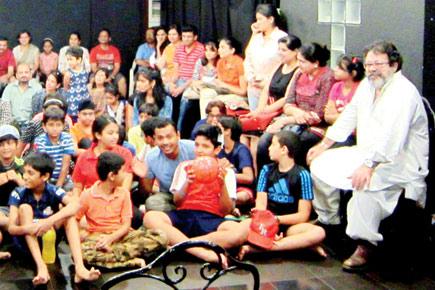
Kunal Kapoor (extreme right) with participants of Summertime@Prithvi 2015
![]() It’s common to hear adults comment on how children today are smarter than they ever were. Keeping up with the wizkids Prithvi Theatre’s Summertime @Prithvi will include workshops for four-year-olds for the first time, this year. “The arts, and the performing arts in particular, can bring joy, a richness of experience, a depth of feeling and new dimensions into your life. The earlier that one is able to start experiencing this, the better it is, especially as once you get introduced to the arts at a young age, it never leaves you,” says Tanya Mahajan of Gillo, a Mumbai-based theatre repertory that works exclusively in theatre for young audiences (two to 18 years).
It’s common to hear adults comment on how children today are smarter than they ever were. Keeping up with the wizkids Prithvi Theatre’s Summertime @Prithvi will include workshops for four-year-olds for the first time, this year. “The arts, and the performing arts in particular, can bring joy, a richness of experience, a depth of feeling and new dimensions into your life. The earlier that one is able to start experiencing this, the better it is, especially as once you get introduced to the arts at a young age, it never leaves you,” says Tanya Mahajan of Gillo, a Mumbai-based theatre repertory that works exclusively in theatre for young audiences (two to 18 years).
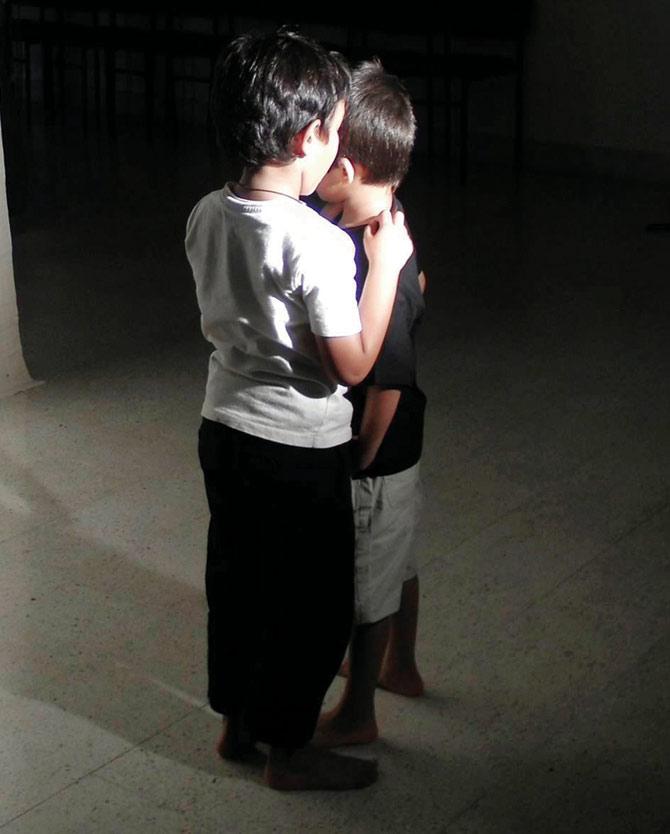
A shadow workshop organised by Gillo
“The common perception is that children are ‘little adults’, and so, things that work for adults can be tweaked and presented for use to children. This is untrue. Children are distinctly different from adults; they have unique ways of responding to the world, of reacting to things around them, and expressing their thoughts and feelings.”
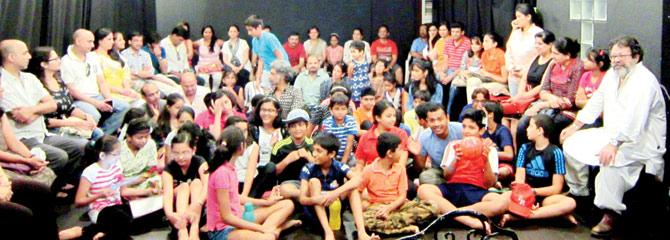
Kunal Kapoor (extreme right) with participants of Summertime@Prithvi 2015
Mahajan recalls how in 2009, when Gillo began, a lot of learning and training was required for most of their team. Understanding language, sentence structure for kid-friendly performances, dialogue structure as well as the appropriate length of a scene in a play meant for a particular age group were key tools to consider. “As we slowly developed the skills in the area, it became clear that we should now use the unique skill set and expertise to solely create performances and experiences for children, “ she adds.
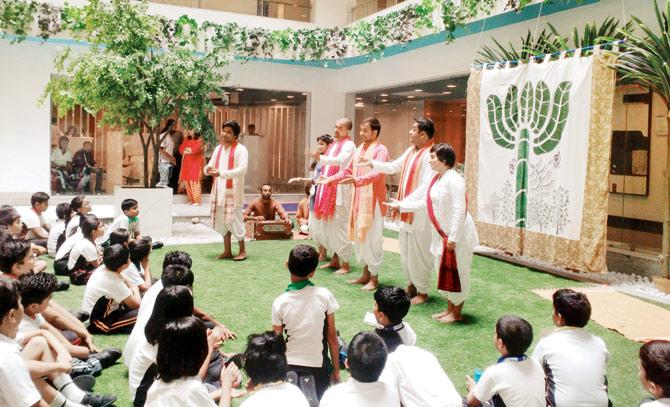
An interactive workshop with school children after the performance of Hanuman Ki Ramayan by Gillo
The mind of a child
Writer, director and actor Makrand Deshpande, who will hold a seven-day acting workshop for 13 to 16-year-olds at Prithvi theatre, uses a different technique to work with children. “A child’s mind is not that cluttered as yet. For adults, often the mind comes before the acting. Actors tell me that they will prepare for the scene and return the next day. I reply that life prepares one anyway. When people create character sketches with socio-political and socio-economic backgrounds, acting gets scientific, and people forget the most important aspect, which is instinct,” says Deshpande. “Kids should be allowed to just act.
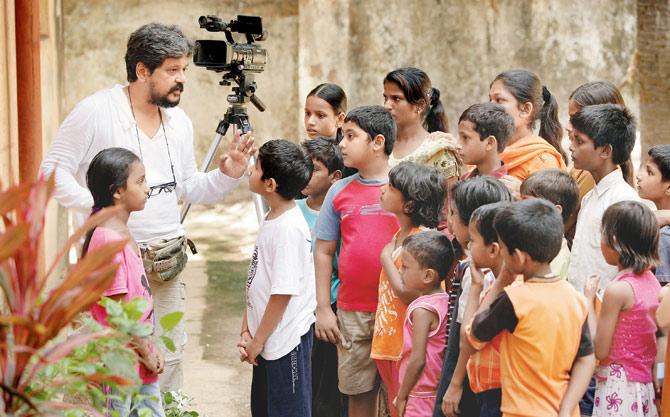
Amole Gupte of Taare Zameen Pe fame with participants at a cinema workshop
They grasp and observe a lot. The idea is to let them use their imagination and not try to teach too much. At times, when I say something in the beginning and change the dialogue later, kids correct me,” he admits, adding that not all children who attend workshops wish to pursue theatre as a career but the idea is to expose them and get them to think about it.
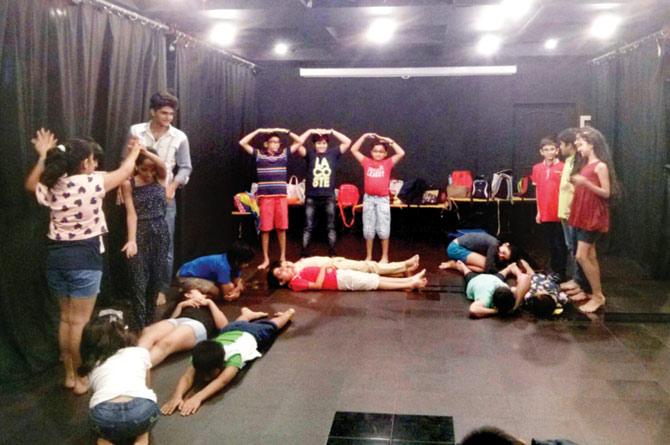
Students at Faezeh Jalali’s workshop
Faezeh Jalali, a theatre professional, who directed the annual play in 2008 at a city school, believes, “Children do almost everything better than adults. They are uncensored, open to creating and sense everything quickly.” Jalali will conduct a workshop for children between four and five at the festival. “Children at any age don’t like to be treated like children. I treat all my students as equal. The advantage of these workshops is that they start trusting their own imagination, learn to work with others and respect their ideas. The key learning is that it is okay to make mistakes and to express,” she says.
.jpg)
Faezeh Jalali
“Children who get involved in theatre, either through performances, or through workshops, learn about teamwork, using their imagination, understanding stories and their sub-texts, observing people around them while trying to portray a character, how to give space and time to each other — about small details of the world around them that they try to recreate on stage. They also learn how a play is put-together with elements like the set design, costumes, music and movement,” shares Mahajan, adding that the workshops go beyond teaching how to act to become stars in the future.
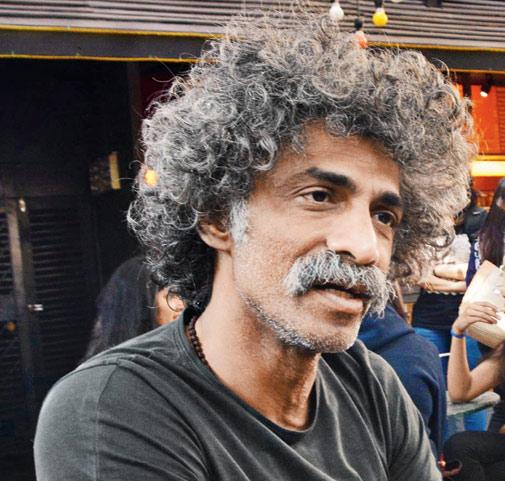
Makrand Deshpande
Prithvi’s Kunal Kapoor echoes the sentiment. “We discourage parents who want to train their child for television. Our aim is simply to expose the children to the exciting world of the arts and awaken their imagination, and inculcate team spirit, appreciation and respect for the arts. We do not support the making of child actors,” he says.
In the digital age
Despite the popularity of mediums like television and digital platforms, these workshops have managed to remain popular with both, children and parents. “Nothing can take away from the ‘real thing’. To feel, touch and experience first hand is irreplaceable and unfortunately, becoming difficult to experience,” asserts Kapoor.
Not just theatre but cinema too is now being taught to the young. Filmmaker Amole Gupte, who started dedicated film appreciation classes for underprivileged children (as young as six-year-olds), nine years ago, says, “Movie-making is not rocket science. Children don’t need to wait to get a degree to appreciate the works of masters.
Sometimes the viewpoint is myopic because the exposure is restricted to Bollywood cinema and soaps on television. An early encounter with the art will ensure that they invest in themselves and the art,” says Gupte. “When you see impoverished people watch a film on a cloth screen without blinking, you know you have arrived. In schools, art sometimes gets restricted to drawings of two mountains, the sun and the river. We want to canvas for these classes to be a part of school curriculum,” he concludes.
Submissions for Summertime@Prithvi start
From: April 10
For details, Log on to: www.prithvitheatre.org
 Subscribe today by clicking the link and stay updated with the latest news!" Click here!
Subscribe today by clicking the link and stay updated with the latest news!" Click here!







